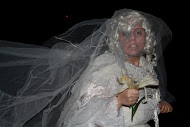Something conclusive this way comes: The Sunday report, IndyFringe's final day
Part of the IndyFringe excitement is that no one has come between you and any show you're seeing. That is to say, no jury made the selection. That's why you will encounter duds from time to time. When you do, you have no shadowy, judgmental figure behind the scenes to be annoyed at. If you don't like a show, you have faced the source of your annoyance right there in front of you, within the allotted hour, as you took in the performance.
I faced mine in the middle of Sunday afternoon. The University tWits, its self-deprecating name not quite disarming all criticism, is a six-person troupe from Bloomington specializing in sketch comedy on contemporary subjects. Its final show at the Phoenix Theatre's Russell Stage was not well attended, with the audience just twice the size of the company. Word of mouth works both ways in guiding patrons' choices, apparently.
An initial scene purporting to be full of disagreements about how to begin did not lead one to expect great things. It proved to be an omen for the show, in which even the well-done bits were on the verge of being heavy-handed, and were sure to have worn out their welcome if only so many of them had not been so short. So quick was the succession of blackouts that what seemed a half-formed idea for a sketch often turned out to be the whole thing. I suspect some of these fledglings were destined never to take wing; the ground around the home tree would be littered with tiny bird carcasses.
I got the feeling that university sketch-comedy troupes must work something like the staffs of college literary magazines. The staff sits around to decide which of the submissions will go into the next issue. Most of the submissions are the work of the staff, every member of which is anxious not to hurt anyone else's feelings. So, within the group very little is rejected and thus, literary hobby work gets passed on to a tiny public.
The University tWits had repeated sketches involving two meddlesome older women who practically attack young people they erroneously feel are in need of caring advice. Apart from illustrating the intergenerational warfare that has existed from time immemorial, none of these sketches had two sticks of wit to rub together so as to strike sparks.
I found some clever observation of college-roommate problems illuminated in one sketch, in which one kid tries to deal with his personal shortcomings by bringing in a nebbish as a replacement for a scapegoat roommate and treating him for a time like the answer to all his problems. It turns out not to be the solution in this case; for this troupe, however, replacement writers might be the way to go, plus a strict director.
 |
| Amy Hayes in "Miss Havisham's Wedding Night" |
Dominick Argento's 1979 one-act monodrama, "Miss Havisham's Wedding Night," is the centerpiece of the production, featuring Amy Elaine Hayes in a powerhouse performance. Her performance Sunday was emotionally gripping and musically nuanced, paced perfectly with Amanda Hopson's accompaniment at an electronic keyboard. Phrasing and diction were exemplary, and the soprano (and Intimate Opera's guiding force) sang securely throughout the wide vocal range required. Such a well-prepared show upholds the relevance of "high art" in the wonderful mixture characteristic of Fringe offerings.
The presentation was supplemented by soprano Julie Strauser singing a coloratura showcase, Saint-Saens' "The Nightingale and the Rose," and Amy Beach's setting of "Take, O Take Those Lips Away." Strauser later plays the adoptive daughter Estella, groomed (a role only hinted at as the opera ends) to exact revenge upon all men. Rachel Konchinsky-Pate had speaking roles as the Narrator and the Maid.
Ending my #Fringe13 experience, as music from the beer tent discordantly bled through the western wall of the IndyFringe Basile Theater, was "Something Wicked This Way Comes, " a well-knit anthology of Shakespeare excerpts focusing on villainous or abused women, knit together by a male narrator and framed by the famous witches in "Macbeth," played by three women. The actresses took on a host of other female roles, ranging from Ophelia and Joan of Arc (primarily victims) through the calculating Lady Macbeth, one-half of what one critic has aptly called the happiest marriage in Shakespeare, and Tamora, the fearsome Queen of the Goths in "Titus Andronicus."
The narration placed just enough context around the women's magnetic performances to be useful, though it's pretty clear that significant acquaintance with the plays could only increase the pleasure of those who attended. The witches' cauldron was the show's glowing centerpiece, the focal point and symbolic representation of all human temptations to work harm upon others, by natural or supernatural means and irrespective of gender identity.
"Unsex me here!" — the Lady Macbeth line delivered with a ferocious shout in Sunday's performance — sums up the show's emphasis on the neutering power of evil and the desperate energy released when women are moved or forced to contend in arenas ruled by men at their worst.



Comments
Post a Comment